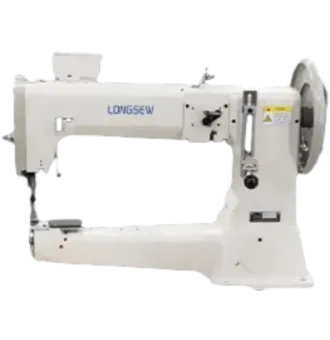commercial sewing machine needles
Understanding Commercial Sewing Machine Needles
In the world of garment production and textile manufacturing, commercial sewing machine needles play a critical role in ensuring high-quality stitching and durability of the finished products. Whether for apparel, upholstery, or industrial projects, choosing the right needle can dramatically affect both efficiency and outcomes.
Commercial sewing machine needles come in a variety of types, sizes, and features, each tailored for specific fabrics and sewing purposes. The size of the needle is denoted by a number system, with larger numbers corresponding to thicker needles suitable for heavy fabrics, while smaller numbers are ideal for lighter materials. For example, a size 70/10 needle is typically used for lightweight fabrics like silk, whereas a size 100/16 needle is better suited for thicker materials like denim or upholstery.
There are several types of commercial needles, including universal, ballpoint, and sharp needles, each designed for different fabric types. Universal needles have a slightly rounded point, making them versatile for various woven and knit fabrics. Ballpoint needles are specifically designed for knit fabrics, allowing them to penetrate without damaging the fibers, while sharp needles are best used with woven fabrics, providing clean and precise stitching.
commercial sewing machine needles

The material of the needle is also essential. Most commercial sewing machine needles are made from high-quality steel, enhanced with coatings to reduce friction and prevent wear. Titanium-coated needles, for example, last longer than their standard counterparts, making them a popular choice for intensive sewing applications.
Some commercial sewing machines may require specialized needles, like double needles for decorative stitching or quilting needles designed for layered fabrics. It is essential for manufacturers and sewists to refer to their machine’s specifications to select compatible needle types.
Proper maintenance and storage of sewing machine needles can extend their lifespan. Needles should be changed regularly, especially when sewing on different fabric types or when the needle has begun to dull. A dull needle can lead to skipped stitches, fabric snagging, and even damage to the sewing machine.
In conclusion, understanding the various types and functions of commercial sewing machine needles is crucial for anyone in the sewing industry. Selecting the appropriate needle can not only improve the quality of the work produced but also enhance the efficiency of the sewing process. Whether you're a seasoned professional or a newcomer to the craft, investing in the right needles for your commercial sewing machine will undoubtedly lead to better results and higher satisfaction in your projects. Proper needle selection is not just an accessory; it's a vital ingredient in the recipe for sewing success.
-
Boost Production Efficiency with a Pattern Sewing MachineNewsAug.29,2025
-
Industrial Excellence with the Best Heavy Duty Sewing MachineNewsAug.29,2025
-
Precision and Power with the Best Pattern Sewing MachineNewsAug.29,2025
-
Reliable Bulk Packaging Starts With the Right FIBC Sewing MachineNewsAug.29,2025
-
Advanced Packaging Solutions: Elevate Productivity with Jumbo Bag Sewing Machine and Industrial Stitching EquipmentNewsAug.29,2025
-
High-Performance Solutions for Bulk Packaging: FIBC Sewing Machine and MoreNewsAug.29,2025
-
Maximize Efficiency with an Industrial Cylinder Arm Sewing MachineNewsAug.28,2025


























